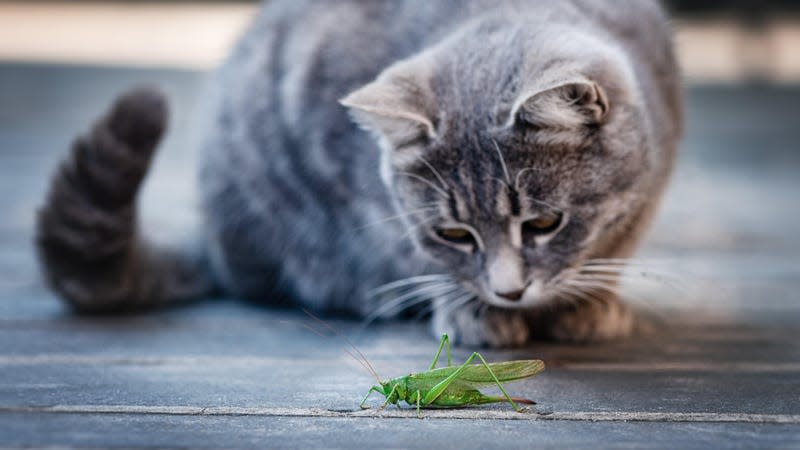Would You Feed Your Cat a Diet of Bugs? Take a Survey for Science

Scientists in California want to know if you would ever feed your cat a bowl of bug chow. They’re looking to survey cat owners about their attitudes on the emerging trend of insect-based cat diets, which some researchers and advocates say could be more sustainable and possibly even healthier than traditional pet food.
The research is being conducted by scientists with the Animal Welfare Epidemiology Lab at the University of California, Davis. In the past, they’ve asked pet owners about the health of their aging cats, whether they would be willing to take advantage of remote vet visits, and about how well their cats socialize with others. This latest project is being led by Emily Jang, a fourth-year undergraduate researcher and animal biology major.
“Our research study mainly aims to garner cat owners’ opinions on insect-based cat diets in order to assess what makes them more or less willing to purchase and use such foods,” Jang told Gizmodo in an email.
Jang notes that several studies have pointed to the potential benefits of an insect-based diet for cats (and dogs). Cats in the wild will naturally eat insects occasionally, and some edible insects are known to have a rich mix of nutrients. And since most dietary allergies in cats are tied to beef, dairy, or fish, it’s possible insect-based diets would be less likely to cause allergic reactions. The techniques needed to mass-produce insects for food are also thought to be more environmentally sustainable than traditional sources of meat, such as cattle.
There is an ongoing debate over whether edible insects can become an important part of human diets (including if enough people will ever be able to stomach the notion of eating them), but the insect-based pet food industry seems to be growing steadily. There are now dozens of brands being sold worldwide. Many of these are primarily in Europe, but the industry has begun to emerge in the U.S. as well.
According to Jang, however, there’s been very little research looking at what American cat owners think about all this. And that’s a knowledge gap that her team is hoping to remedy.
“Insect-based cat foods have great potential for success and mass popularity, but we need to collaborate with U.S. cat owners to collect their opinions on this rising trend,” Jang said.
The team is hoping to collect responses from at least 400 people over the age of 18 who own at least one cat. They’ll be looking to see if people’s attitudes toward insect cat diets could be tied to other factors, such as their concerns about the environment or their cats’ existing dietary habits. They’d also like to know if there’s any information in particular about these diets that could convince cat owners to take a chance on them. Should the project go as scheduled, the team plans to submit their findings to a peer-reviewed journal by this September.
“I hope readers will venture into this rising topic of cat foods with sincerity and consideration,” Jang said. Any willing cat owners can take part in the 10-minute survey by clicking here.

